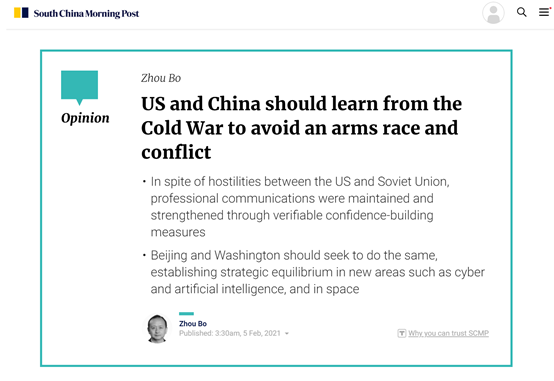
Last October, US and Chinese defense officials convened their first Crisis Communications Working Group to discuss crisis prevention and management. The meeting was unusual in discussing “crisis” for the first time, rather than “accidents”. It showed that the two militaries have begun to worry about things getting out of hand when bilateral ties go into free fall.
For over two decades, China-US military discussions have often been in a Catch-22 situation: Americans wanted technical discussions, say, on how to avoid close and dangerous encounters between ships and aircraft, while the Chinese would point out that these encounters in Chinese waters should simply stop
Americans would then cite their right to freedom of navigation and overflight, and ask Chinese ships monitoring American vessels to keep a safe distance. The Chinese response? You are safest when you stay away.
So, how can they avoid unwanted confrontation? The answer is: professionalism. During the Cold War, professionalism helped to avoid a nuclear fallout between two bitter enemies. This is reflected in the growing list of confidence-building measures that include the Strategic Arms Limitation Talks, the Anti-Ballistic Missile Treaty and Strategic Arms Reduction Treaty.
China and the US are not enemies. But reducing the risks between them could be more challenging than it was for the US and the Soviet Union. First, there were clearly defined spheres of influence between Washington and Moscow, which allowed them to avoid direct confrontation.
But there isn’t even a buffer zone between Beijing and Washington. American naval vessels regularly sail through the waters off Chinese islands and rocks in the South China Sea and the Taiwan Strait.
Secondly, the US and the Soviet Union were balanced by mutually assured destruction. This is not the situation with Beijing and Washington.
The People’s Liberation Army lags far behind the US military, although in the Western Pacific, the gap is closing – to the extent that the US believes an ever-confident China wants to drive it out of the Indo-Pacific.
Therefore, Washington is investing more militarily in the region and calling on its global allies and partners to gang up on China. This in turn irks the Chinese and makes the situation more volatile.
For Beijing and Washington to avoid conflict, the first step is to observe the agreements already made. The most dangerous place is at sea. The key is for ships and aircrafts to keep a safe distance.
But what exactly is a safe distance? Many factors including visibility, vessel maneuverability and an understanding of the maneuvering intentions of the other vessel have to be considered.
They require not only serious discussions, but also regular training to ensure good seamanship. The two militaries conducted joint drills to avoid unplanned encounters at sea in 2014, 2015 and 2016. Such exercises should continue, in part because a stronger PLA Navy now meets the US Navy more regularly in international waters.
Professionalism is more needed in de-escalating incidents after they occur, such as the deadly collision between two military aircrafts in 2001 and a narrowly avoided collision of two naval vessels in 2018.
The most significant discussion of the Crisis Communications Working Group meeting was what to do after an incident, which had not been discussed before. This might help to prevent incidents from happening in the first place.
As the gap in strengthing between the Chinese and American militaries becomes smaller, both countries need to discuss strategic equilibrium in new areas such as cyber and artificial intelligence, and space. It is difficult to tell whether cyber incidents are espionage or cyberwarfare.
But the bottom line is not to attack critical information networks, such as military command and control systems. In 2013, Washington and Moscow established links between their national computer emergency response teams, agreed to warn each other of cyber exercises through the Nuclear Risk Reduction Centre and set up a direct hotline between the White House and the Kremlin.
Beijing and Washington also have hotlines at governmental and military levels. Eventually, both countries might wish to exchange a list of sensitive targets that should be forbidden from coming under attack in any circumstances.
In artificial intelligence, if preventing AI from being weaponized is not possible, China and the US could lead in building international norms and reducing risks related to AI-enabled military systems. The sooner this is done, the better, while AI is still a nascent development.
As Brookings Institution president John R. Allen put it, once AI is embedded into military systems and applied, there will be less willingness to roll back any new capabilities they afford, particularly given how costly such systems are to develop.
The 2011 Wolf Amendments limit US government agencies such as Nasa from working with Chinese commercial or governmental agencies, but could not handicap the self-reliant Chinese space industry.
A Chinese space station will be built in 2022, and might be the only space station left in orbit after the International Space Station built by the US comes to the end of its life in 2030.
Will the US, which has refused Chinese astronauts’ entry into its space station, ask China for a ride then? And would Beijing agree?
Donald Trump’s establishment of the US Space Force in 2019 has ushered in an arms race in space. But in civil space exploration, partnerships are still preferable. Since space belongs to no one, why not make the exploration of Mars a joint effort?
That the Cold War did not become a hot war was not down to sheer luck. In spite of hostilities, professional communications were maintained and strengthened through verifiable confidence-building measures.
No one knows how the China-US relationship might evolve, but for competitors to not become enemies in a new cold war, they need a long list of confidence-building measures. The longer the list, the smaller the risk of war.
(Senior Colonel Zhou Bo (ret) is a senior fellow of Center for International Security and Strategy Tsinghua University and a China Forum expert)
